Safety and Health Practicesfor Nail Salon Workers and a Training Guide for Nail Salon Worker Safety and Health Outreach Program
Safety and Health Practicesfor Nail Salon Workers and a Training Guide for Nail Salon Worker Safety and Health Outreach Program
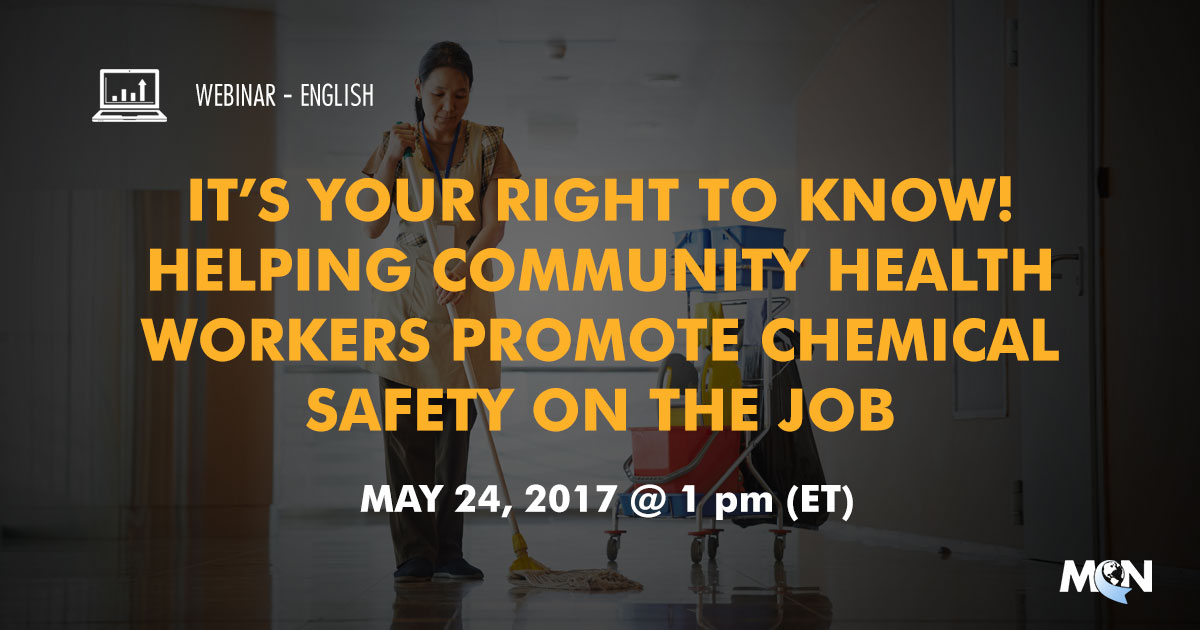
DATE: May 24, 2017, 1 pm (ET)
SPEAKERS: Juliana Simmons, MSPH, CHES
To receive CME* or CNE credit after viewing this webinar, you must:
José Navarro was excited for his new career after landing a job in the poultry industry. After five years on the job, 37 year-old Navarro began coughing up blood. He died soon after when his lungs and kidneys failed. His death triggered a federal investigation raising questions about the health risks associated with the use of toxic chemicals in poultry plants.
Millions of workers are exposed to chemicals everyday on the job. All workers have the right to know about the chemicals they work with and community health workers can be an important source of information and support for workers. This workshop will teach community health workers how to explain what happens when someone is exposed to chemicals and how workers can best protect themselves
This project is supported by the Health Resources and Services Administration (HRSA) of the U.S. Department of Health and Human Services (HHS) under cooperative agreement number U30CS09742, Technical Assistance to Community and Migrant Health Centers and Homeless for $1,094,709.00 with 0% of the total NCA project financed with non-federal sources. This information or content and conclusions are those of the author and should not be construed as the official position or policy of, nor should any endorsements be inferred by HRSA, HHS or the U.S. Government.
DATE: May 10, 2017, 1 pm (ET)
SPEAKERS: Patria Alguila and Ileana Ponce-Gonzalez, MD, MPH, CNC
To receive CME* or CNE credit after viewing this webinar, you must:
In this webinar participants will be able to identify the Health Resource Services Administration performance measures related to depression, describe symptoms of depression, understand how to encourage patients to control and manage their diabetes and depression, and understand the principle barriers faced by patients in the control and management of their diabetes and depression
This project is supported by the Health Resources and Services Administration (HRSA) of the U.S. Department of Health and Human Services (HHS) under cooperative agreement number U30CS09742, Technical Assistance to Community and Migrant Health Centers and Homeless for $1,094,709.00 with 0% of the total NCA project financed with non-federal sources. This information or content and conclusions are those of the author and should not be construed as the official position or policy of, nor should any endorsements be inferred by HRSA, HHS or the U.S. Government.

FECHA DE GRABACION: 3 de Mayo de 2017, 1 pm ET (zona horaria del Este)
ORADORAS: Ileana Ponce-Gonzalez, MD, MPH y Daniel Ramos, MPH
Para recibir credito de Trabajador/a de Salud Comunitaria o Educacion de Continua de Enfermera después de ver alguno de estos seminarios usted debe hacer lo siguiente:
En este seminario los participantes podrán identificar las medidas de desempeño de la Administración de Servicios de Recursos de Salud relacionadas con la depresión, podrán describir los síntomas de la depresión, entender cómo alentar a los pacientes para que ellos mismos puedan controlar su diabetes y depresión, y comprender las barreras principales que enfrentan pacientes con diabetes en el control y manejo de su enfermedad y la depresión.
Este proyecto cuenta con el apoyo de la Administración de Recursos y Servicios de Salud (HRSA) del Departamento de Salud y Servicios Humanos de los Estados Unidos bajo el acuerdo de cooperación número U30CS09742, Asistencia Técnica a Centros de Salud Comunitarios y Migrantes y Personas sin Hogar por $ 1,094,709.00 con 0% del total Proyecto NCA financiado con fuentes no federales. Esta información o contenido y las conclusiones son las del autor y no deben ser interpretadas como la posición o política oficial de, ni cualquier endosos deben ser inferidos por HRSA, HHS o el Gobierno de los Estados Unidos.
"Emerging Infectious Diseases is an open access journal published monthly by the Centers for Disease Control and Prevention (CDC)." ... "Emerging Infectious Diseases follows the International Committee of Medical Journal Editors recommendations for the conduct, reporting, editing, and publishing of scholarly work in medical journals. The journal’s peer review process allows for critical assessment of submitted manuscripts by experts who are usually not part of its editorial staff. As an independent publication, the journal’s peer-review process operates independently from CDC’s clearance processes."
Resources in English and Spanish from Florida State University's Center for Child Stress and Health on how to talk to a child about deportation and associated stress.
Available in English and Spanish!
Created by MCN, medical student Rachel Kelley of UCSF, and collaborators at East Tennessee State University, this guide is intended to be a reference for health care providers who work with people employed in the U.S. tomato industry. It aims to prepare providers with a more detailed understanding of hazards, health issues, and work processes associated with different tomato industry jobs.
This guide draws on published research, experienced health professionals’ advice, and information gathered from interviews and focus groups conducted with 36 tomato workers from diverse backgrounds and 14 community leaders familiar with tomato workers’ health in multiple states. It is important to note that health and safety conditions at any particular farm or company may vary from what is described here. Furthermore, individual workers may experience the same set of conditions differently.
The first section of the guide focuses on health hazards and health conditions commonly encountered in tomato production. The second section consists of detailed descriptions and illustrations of different tomato production tasks. The third section covers “human resources” information and policies that apply to U.S. agricultural workers generally. The appendices contain a Spanish-English glossary, further detail about different types of pesticides, information about agricultural occupational health policies and regulation, and a list of resources and readings.
A kit from the CDC designed to help reduce the risk of infection by the Zika virus. "If you live in a state or area with the mosquito that spreads the Zika virus and are concerned about Zika, build your own Zika Prevention Kit (...). Reducing the risk for Zika is particularly important for pregnant women."
Information from the CDC on the Zika Virus and pregnant women.
Zika educatinal materials from the Texas Department of State Health Services which includes fact sheets, push cards, posters, and TV PSAs. Available in both English and Spanish.

FECHA DE GRABACION: 5 de Abril de 2017, 1 pm ET (zona horaria del Este)
ORADORA: Ileana Ponce-González, MD, MPH, CNC
Para recibir credito de Trabajador/a de Salud Comunitaria o Educacion de Continua de Enfermera después de ver alguno de estos seminarios usted debe hacer lo siguiente:
En este webinar, los participantes podrán identificar las medidas de desempeño de la Administración de Servicios de Recursos de Salud relacionadas con la hipertensión, describir cómo medir la hipertensión en el cuerpo, entender cómo alentar a los pacientes a controlar y manejar su presión arterial alta y entender las principales barreras que enfrentan pacientes en el control y manejo de su presión arterial alta.
Este proyecto cuenta con el apoyo de la Administración de Recursos y Servicios de Salud (HRSA) del Departamento de Salud y Servicios Humanos de los Estados Unidos bajo el acuerdo de cooperación número U30CS09742, Asistencia Técnica a Centros de Salud Comunitarios y Migrantes y Personas sin Hogar por $ 1,094,709.00 con 0% del total Proyecto NCA financiado con fuentes no federales. Esta información o contenido y las conclusiones son las del autor y no deben ser interpretadas como la posición o política oficial de, ni cualquier endosos deben ser inferidos por HRSA, HHS o el Gobierno de los Estados Unidos.
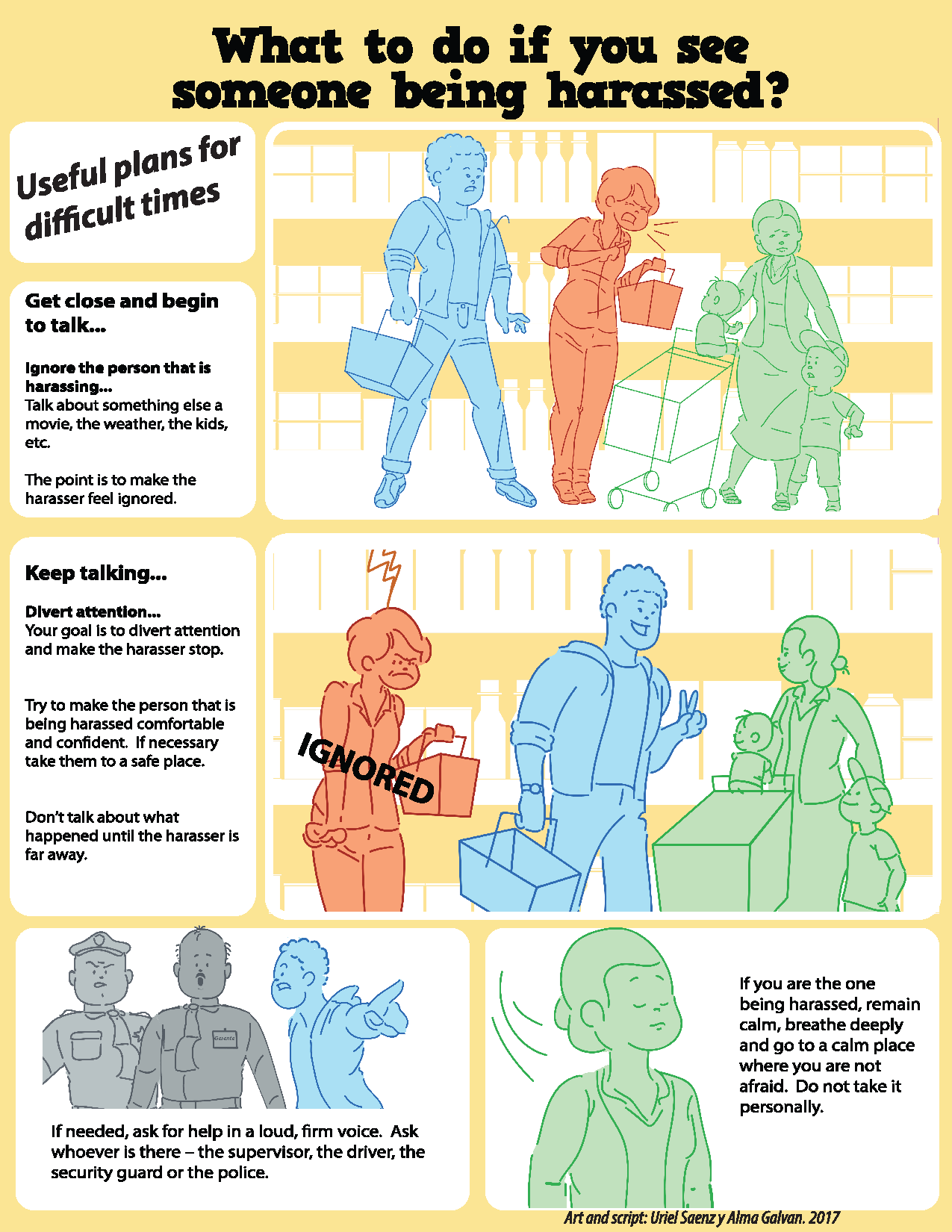
A guide to know how to react when you see someone being harassed. Art and script by Uriel Saenz and Alma Galván.
Chapter 14: Pesticides Are Poison from the Hesperian.org health guide: A Community Guide to Environmental Health.

FECHA DE GRABACION: 29 de Marzo de 2017, 1 pm ET (zona horaria del Este)
ORADORA: Ileana Ponce-González, MD, MPH, CNC
Para recibir credito de Trabajador/a de Salud Comunitaria o Educacion de Continua de Enfermera después de ver alguno de estos seminarios usted debe hacer lo siguiente:
En este seminario los participantes serán capaces de identificar las medidas de rendimiento de HRSA relacionadas con la salud bucodental, así como los factores de riesgo para la mala salud bucal. También reflexionaremos sobre el importante papel que desempeñan los promotores de salud en la mejora del acceso a los servicios de salud bucodental.
Este proyecto cuenta con el apoyo de la Administración de Recursos y Servicios de Salud (HRSA) del Departamento de Salud y Servicios Humanos de los Estados Unidos bajo el acuerdo de cooperación número U30CS09742, Asistencia Técnica a Centros de Salud Comunitarios y Migrantes y Personas sin Hogar por $ 1,094,709.00 con 0% del total Proyecto NCA financiado con fuentes no federales. Esta información o contenido y las conclusiones son las del autor y no deben ser interpretadas como la posición o política oficial de, ni cualquier endosos deben ser inferidos por HRSA, HHS o el Gobierno de los Estados Unidos.
DATE: February 21, 2017
SPEAKERS: Ed Zuroweste, MD
To receive CME* or CNE credit after viewing this webinar, you must:
Agriculture is also one of the most dangerous industries in the United States. For vulnerable populations working in agriculture, their lack of training, poor safety precautions, regulatory exclusions, lack of health insurance, language barriers, piece-rate pay, immigration status, and geographical and cultural isolation can put these workers at increased risk for occupationally related injuries and illnesses and chronic sequelae. Exposure to pesticides and other contaminants is a particular concern to agricultural workers and their families. This continuing education training will discuss health risks facing immigrant and migrant agricultural workers and their families as a result of their working conditions and environment, with a particular focus on Kansas. It will also highlight best practices and resources for the incorporation of environmental and occupational health in the practice setting, showcasing successful initiatives in primary care settings. Participants will explore the importance of and become familiar with the methods to integrate environmental and occupational health into the practice setting from the clinical perspective as well as consider these issues within the framework of social determinants of health.
This material was produced, in part, under Assistance Agreement No. X883487601 awarded by the U.S. Environmental Protection Agency. It has not been formally reviewed by EPA. EPA does not endorse any products or commercial services mentioned in this product.
A flier created by the CDC's National Diabetes Education Program as a guide for patients in the management of medicines to treat diabetes. Available in English.
Free and confidential consultation for clinicians from the Clinician Consultation Center at San Francisco General Hospital focusing on substance use in primary care
Objectives of the Substance Use Warmline:
Consultation topics include:
The CCC’s multi-disciplinary team of expert physicians, clinical pharmacists and nurses provides consultation to help clinicians manage complex patient needs, medication safety, and a rapidly evolving regulatory environment.
Learn more at http://nccc.ucsf.edu/clinician-consultation/substance-use-management
This 90-minute webinar was created for physicians, nurses, and other health professionals who treat and case manage patients with active TB. The webinar introduced the 2016 Official American Thoracic Society/Centers for Disease Control and Prevention/Infectious Diseases Society of America Clinical Practice Guidelines: Treatment of Drug-Susceptible Tuberculosis. This training highlighted the guidelines development process, the key changes in recommendations, and discussed the evidence supporting the changes. The webinar was originally presented on November 4, 2016. This training was jointly sponsored by all 5 RTMCCs.

DATE RECORDED: August 17, 2016 at 1 pm ET
PRESENTED BY: Amy Liebman, MPA, MA and Wilson Augustave, member of MCN’s Board of Directors and Senior HIV Case Manager at Finger Lakes Community Health
This material will be produced under grant number SH-27640-15-60-F-48-SH5 from the Occupational Safety and Health Administration, U.S. Department of Labor. It will not necessarily reflect the views or policies of the U.S. Department of Labor, nor does mention of trade names, commercial products, or organizations imply endorsement by the U.S. Government.
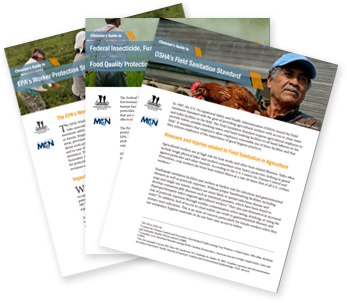
MCN and Farmworker Justice offer these guides to assist clinicians in understanding farmworker health and safety regulations. OSHA’s Field Sanitation Standard; EPA's Federal Insecticide, Fungicide, and Rodenticide Act (FIFRA); EPA's Food Quality Protection Act (FQPA); EPA’s Worker Protection Standard (WPS).
Este diccionario ilustrado bilingüe de MCN, "Seguridad en Palabras/ Safety in Words", muestra los peligros que hay en el lugar de trabajo y las mejores prácticas para la salud y la seguridad en la agricultura. Desarrollado con el apoyo del Programa de Subvenciones Susan Harwood de OSHA, este recurso refuerza el vocabulario en inglés de los trabajadores que hablan español lo que ayudará a prevenir lesiones en la agricultura.
DATE RECORDED: Wednesday, June 17, 2014
PRESENTED BY: Matthew Keifer, MD, MPH, Dean Emanuel Endowed Chair/Director National Farm Medicine Center
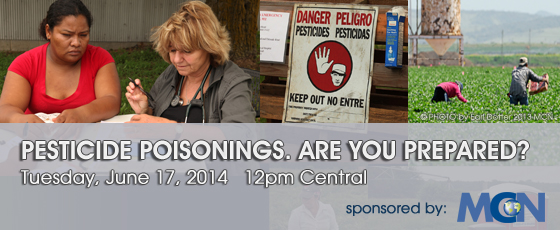 |
|
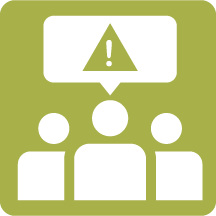 MCN’s Environmental and Occupational Health Programs
MCN’s Environmental and Occupational Health Programs
Learn more about MCN’s training and technical assistance programs to help clinicians and health centers improve the recognition and management of pesticide exposures and other environmental/occupational health conditions.
Mistakes can be dangerous. Accurate identification of pesticides responsible for a patient's illness is important to avoid iatrogenic errors with respect to acute treatment. Join us for an important webinar that will focus on key decision points in the diagnosis of pesticide exposures and emphasize the usefulness of the newly revised resource for clinicians - The Recognition and Management of Pesticide Poisonings, 6th ed. Through interactive case studies, this webinar will illustrate effective recognition and treatment of patients over exposed to pesticides.
The webinar, sponsored by Migrant Clinicians Network, the National Farm Medicine Center and AgriSafe Network features Dr. Keifer, a board certified occupational medicine specialist and internationally renowned researcher regarding pesticides and agricultural health and safety. For over 30 years, Dr. Keifer has focused his clinical practice and research largely on farmworkers.
SPONSORED BY: AgriSafe Network, Migrant Clinicians Network, and the National Farm Medicine Center
OBJECTIVES: Participants will be able to:
We encourage all participants to order The Recognition and Management of Pesticide Poisonings, 6th ed. prior to attending this webinar. Order here. PDF versions are also available at http://www2.epa.gov/pesticide-worker-safety/recognition-and-management-pesticide-poisonings
If you have experienced any trouble ordering your copy please contact: kbrennan@migrantclinician.org
CLINICAL TOOLS & RESOURCES |
|
PATIENT EDUCATION MATERIALS |
|
ARCHIVED WEBINARS & TRAINING RESOURCES |
|
LOCAL PESTICIDE RESOURCES |
|
The following will provide information regarding the pesticides used in your areas:
|
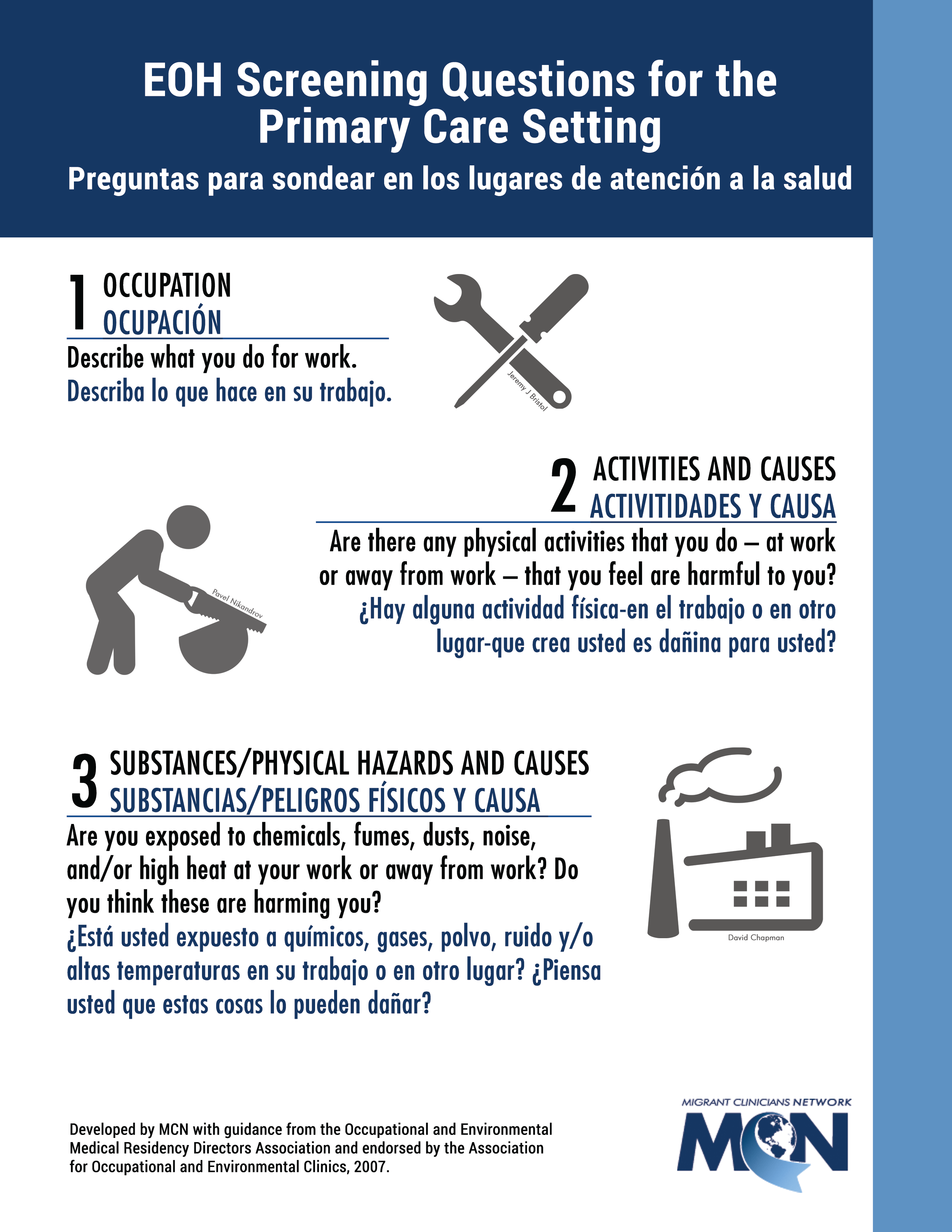
Three concise and effective environmental/occupational health screening questions for the primary care provider. English and Spanish. MCN, 2014.
An EHR-friendly version of these screening questions was developed through MCN's Workers & Health Program. This can be used as a reference for integration into the health center's Electronic Health Record.
This colorful bilingual comic addresses workers' compensation and immigrant dairy farm workers’ rights and responsibilities. It tells the story of a Mexican dairy farm worker who is injured on the job and the steps he and his employer take to make sure he receives his benefits, and the farm improves its safety.
This website and training material were developed to give communities and promotores ways to help farm workers learn how to protect themselves from pesticide exposure.
The project and all materials on the website were developed by the California Poison Control System in collaboration with the the Western Center for Agricultural Health and Safety at the University of California, Davis and the California Department of Pesticide Regulation.

Señales y síntomas de envenenamiento por pesticidas
Developed by the California Poison Control System in collaboration with the Western Center for Agricultural Health and Safety at the University of California, Davis and the California Department of Pesticide Regulation
Haz-Map® is an occupational health database designed for health and safety professionals and for consumers seeking information about the adverse effects of workplace exposures to chemical and biological agents. The main links in Haz-Map are between chemicals and occupational diseases. These links have been established using current scientific evidence.
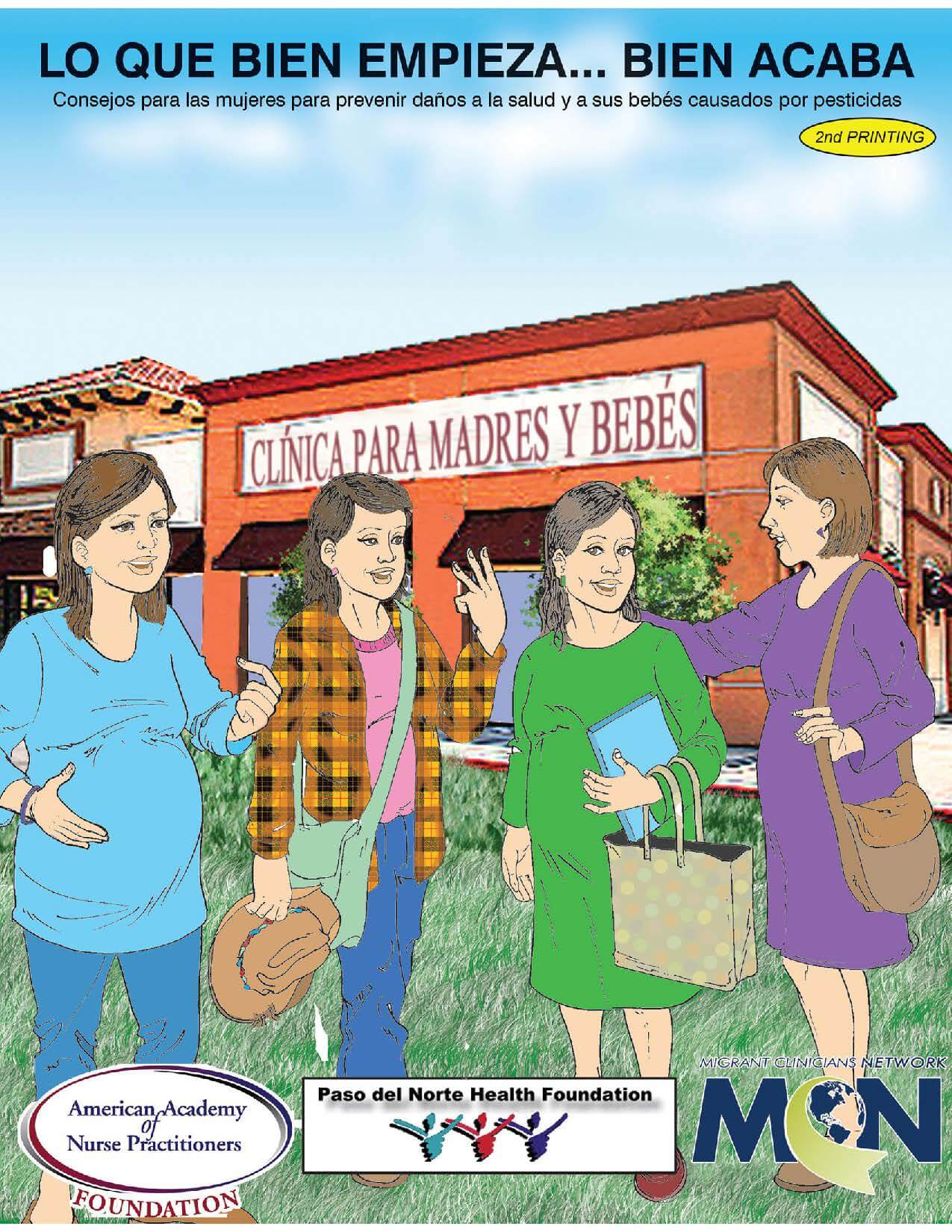
MCN Spanish educational comic book that addresses pesticide exposure in women of reproductive age. LO QUE BIEN EMPIEZA...BIEN ACABA: Consejos para las mujeres para prevenir daños a la salud y a sus bebés causados por pesticidas.
Three printable brochures on Asthma, Lead and Pesticides produced by Farmworker Justice.